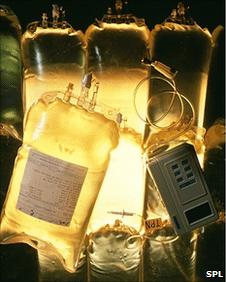Major deficiencies in artificial feeding, inquiry finds
- Published

Artificial feeding is for those who cannot absorb food via the gut
There are major deficiencies in the way hospitals provide artificial nutrition to sick babies and adults, an inquiry has found.
A national safety watchdog found problems in three quarters of the intravenous feeding it cases examined.
Complications were avoidable in half the adult patients reviewed, it said.
Premature babies meanwhile were not always given the sustenance they needed, and delays were rife, the report added.
The report from the National Confidential Enquiry into Patient Outcome and Death (NCEPOD) looked at more than 1,000 cases of artificial - or parenteral - nutrition in England, Wales and Northern Ireland.
Liquid containing key nutrients pumped from a bag directly into a vein is given to patients who cannot digest food through the gut as a result of disease or surgery, or babies whose systems are not mature enough.
Training
A catalogue of problems were uncovered while reviewing questionnaires and case notes from England, Wales and Northern Ireland, the "Mixed Bag" report found.
They included failure to ensure the catheter was inserted by a trained clinician under suitably sterile conditions, as well as lapses in monitoring and assessment.
The report noted that intravenous feeding can cause fatal problems if not properly administered - from failure to take in enough calories and vitamins to blood poisoning - although the team did not itself uncover any deaths.
But it also found that in almost a third of adult cases it was being given where other forms of feeding via the gut were possible, putting patients at risk unnecessarily.
"There's a broader lack of understanding and knowledge of how to feed patients," said Dr James Stewart, NCEPOD clinical co-ordinator.
"Doctors can panic, and think this is the easiest way to go about dealing with a sick patient. But it certainly isn't the easiest, and in some cases it is completely inappropriate."
The group is also calling for greater consensus among neonatologists about best practice for pre-term babies after uncovering a "lottery" in the way in which infants were treated.
Out of the 264 cases reviewed, there were delays in recognising the need for artificial feeding in a third of cases, and further delays in starting treatment once a decision has been taken.
In nearly 40% of cases, the first feeding provided was considered inadequate for the baby's need. Complications, it found, were avoidable in a fifth of the babies treated.
Guidelines
The fact that this "mainstay" of treatment for premature babies was not being offered consistently, or at the right levels, was a cause for concern, NCEPOD said, as all the scientific evidence suggests such feeding improves growth and development.
The inquiry called for the clinical watchdog NICE to develop guidelines on nutritional support for newborns, urging that the need for artificial feeding be considered early and once decision taken, administered immediately.
NCEPOD chairman Bertie Leigh said: "It is deeply depressing that the quality of care is so often unsatisfactory. Indeed, in discussion with the NCEPOD steering group the scale of disappointment verged on disbelief."
He called on the government to appoint a nutrition tsar to "harness the energies of all those involved in artificial nutrition".
Health Minister Anne Milton said it was "simply not acceptable that patients - who are already very ill - get a 'mixed bag' service from the NHS on such an important treatment".
"Clinical leaders across the health service should look carefully at the recommendations, review the service offered at their hospitals, and make improvements to patient care as a matter of urgency," she said.
Jane Abbott of the baby charity Bliss said: "While doctors and nurses caring for sick and premature babies do an amazing job, it is recognised that parenteral nutrition for these vulnerable babies is an area where further improvements are required. We welcome the key recommendations of this report."